Jane Austen Summer Program: Back in all its Regency glory
Attendees solved the mystery of a missing pug in one of many events held in person for the first time since 2019.
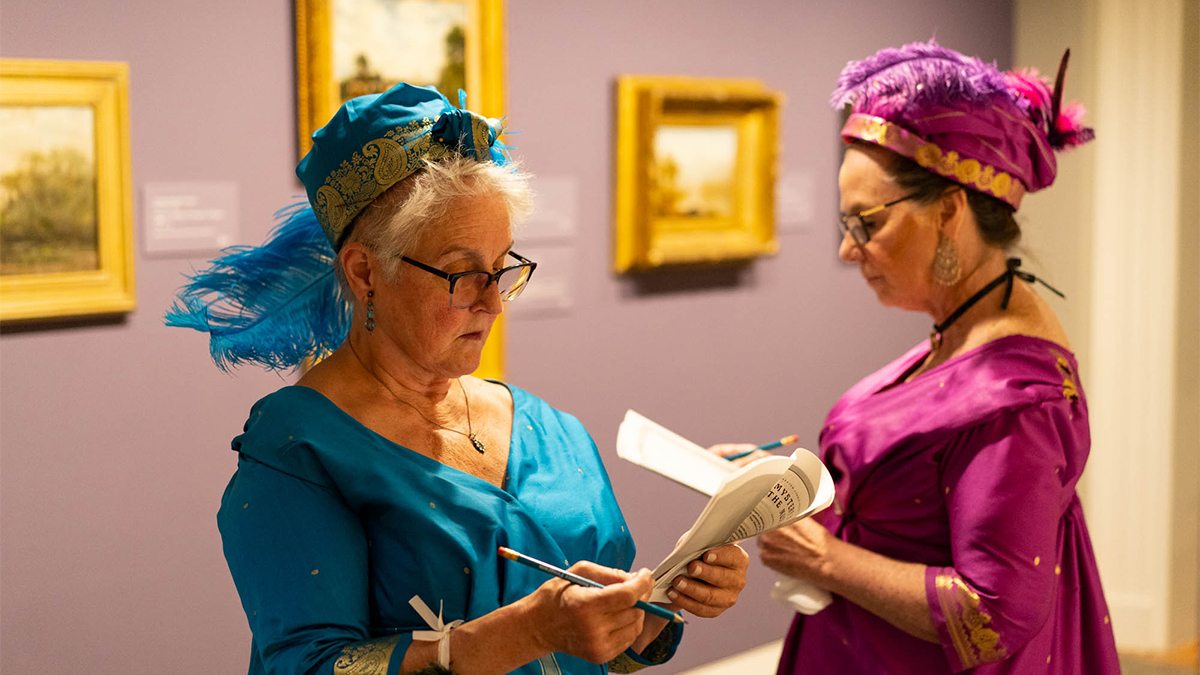
Stepping into the Ackland Art Museum on June 18 was like stepping into another era. The museum was transformed into a scene from Jane Austen’s 1814 novel “Mansfield Park.” Guests gathered in full Regency-era regalia — gowns and tailcoats and toques, the brimless hats popular at the time — as piano melodies drifted through the rooms. The art-filled museum set the scene for a thrilling mystery: Who dognapped Lady Bertram’s beloved pug?
This interactive mystery, written by recent Carolina doctoral graduate Anne Fertig and current Carolina graduate student Erica Sabelawski, was the main social event of the Jane Austen Summer Program, a four-day symposium for fans of the 19th-century English author. This year’s theme was “Austen & Shakespeare.” Attendees read “Mansfield Park” as well as two of the Bard’s early 17th-century plays, “All’s Well That Ends Well” and “King Lear.”
In the summers before COVID-19, the program’s main social events included a sit-down meal and a fan-favorite Regency ball. This year, guests attended a mixer and the Regency mystery instead. Other events included writing and costuming workshops, two film screenings, Sunday tea and a food demonstration. Anchoring the four-day program were academic presentations and panel discussions on topics that included material culture in Austen’s and Shakespeare’s works, the social and political implications of Elizabethan and Regency fashion and Shakespeare on the Georgian stage.
‘Pugsley is missing’
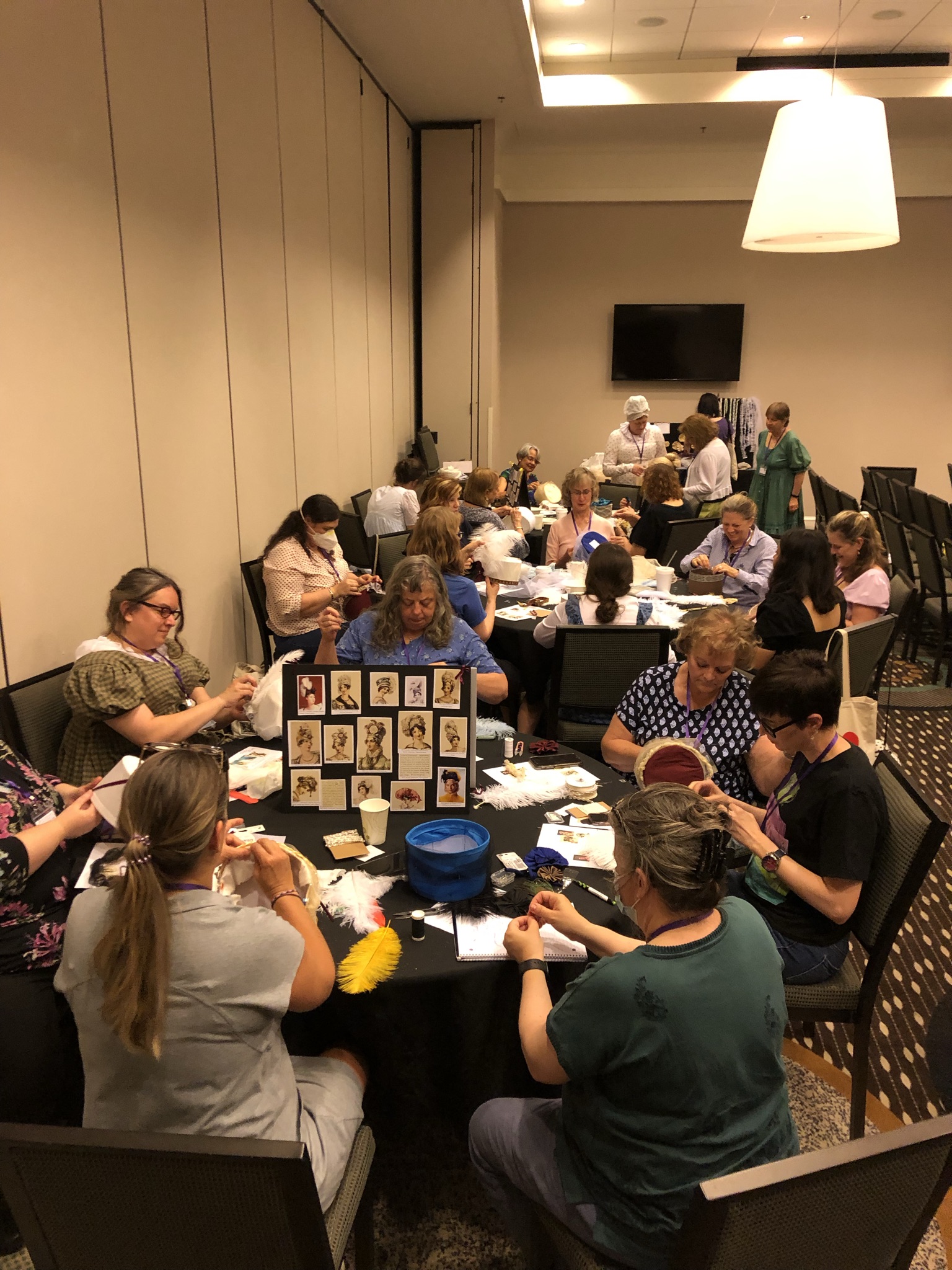
Attendees decorate their toques during a workshop. A toque is a brimless hat. (Photo by Inger Brodey)
As guests arrived, attendants ushered them into a curtained room with an abundance of hors d’oeuvres set out for them to enjoy as they watched an introductory video, projected on a wall. In this video, “Lady Bertram” (played by Anne Fertig) sobbed into a handkerchief as she told her story. “Pugsley is missing,” she said, drawing gasps from the crowd. “Who could have committed such a heinous crime?”
Each attendee was given an “answer sheet” pamphlet to fill out, stocked with clues and riddles that would point to the culprit, their motive and the scene of the crime. And then they were off to solve the mystery, exploring the galleries to find the paintings and sculptures that would help solve the whodunnit and interrogating suspects about their alibis.
Inger Brodey, a professor in the College of Arts & Sciences’ English and comparative literature department, started the Jane Austen Summer Program with her colleague James Thompson in 2013. Brodey said they modeled it in part after Dickens Universe, which is now in its 41st year. They learned of the Dickens summer camp by reading an article written by Jill Lepore in The New Yorker. They were so inspired that they went to California to scout it out, taking some aspects of it to shape their own program.
Brodey said she has loved Jane Austen since she was a preteen. Her brother discovered the author in college and brought books home for Brodey to read.
In the first years of the program, the organizers went through all the major novels. Since then, they have been trying new and interesting combinations to see what attendees like. When the COVID-19 pandemic disrupted campus life in 2020, the program turned its library outreach program, Jane Austen & Co, into a popular online Zoom series with lectures and a live Q&A and then, in 2021, held an online version of the full summer program. The theme was “Jane Austen’s World,” focusing on the author’s life as revealed in two books: “Jane Austen’s Letters,” edited by Deirdre Le Faye, and Claire Tomalin’s biography, “Jane Austen: A Life.”
Austen and the Bard
This year’s theme was a challenging one — “Mansfield Park” is a difficult Austen novel and “All’s Well That Ends Well” and “King Lear” are difficult Shakespeare plays, Brodey acknowledges — but the program sold out yet again.
“Austen owes a debt of gratitude to Shakespeare,” Brodey said. “She alludes to him explicitly but also in more hidden ways in all her novels. We thought it would be a fun way of exploring both authors and giving more depth to people’s understanding of Austen.”
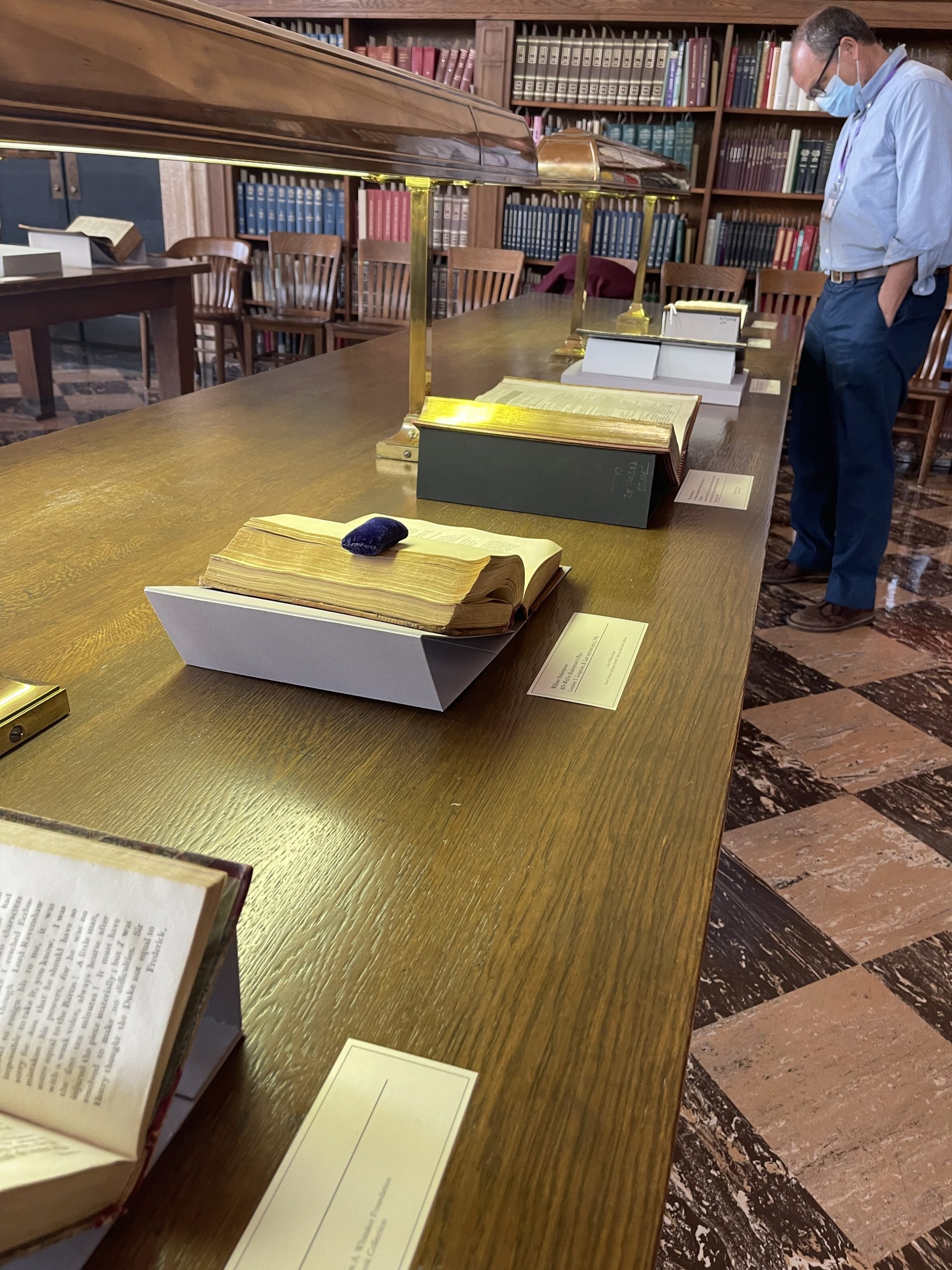
A participant visits the Jane Austen Summer Program’s exclusive rare-book exhibit at the Wilson Library. (Photo by Meredith Ammons)
They chose the novel first — “Mansfield Park,” because it had the most explicit Shakespeare connections — and then the plays to accompany it.
“Some of us disagree about what Shakespeare is most prevalent in ‘Mansfield Park,’ but I deferred to Susan Allen Ford on that,” Brodey said, referring to the Jane Austen scholar and professor of English at Delta State University. “I let her decide, because she’s one of the people who has written most about Austen and Shakespeare, and she was going to be giving one of the talks.”
Additionally, the program’s organizers chose one comedy and one tragedy to showcase another similarity between Austen and Shakespeare.
“Austen in a way riffs on Shakespeare’s problem plays because of the way she weaves tragedy into her comedies,” Brodey said.
That night at the Ackland was similarly marked by both gravity and levity. The actors all took their parts seriously, despite the object of the evening being a missing stuffed pug — although if guests were thoroughly stumped, they were happy to lend a helping hand.
Bonding over literature
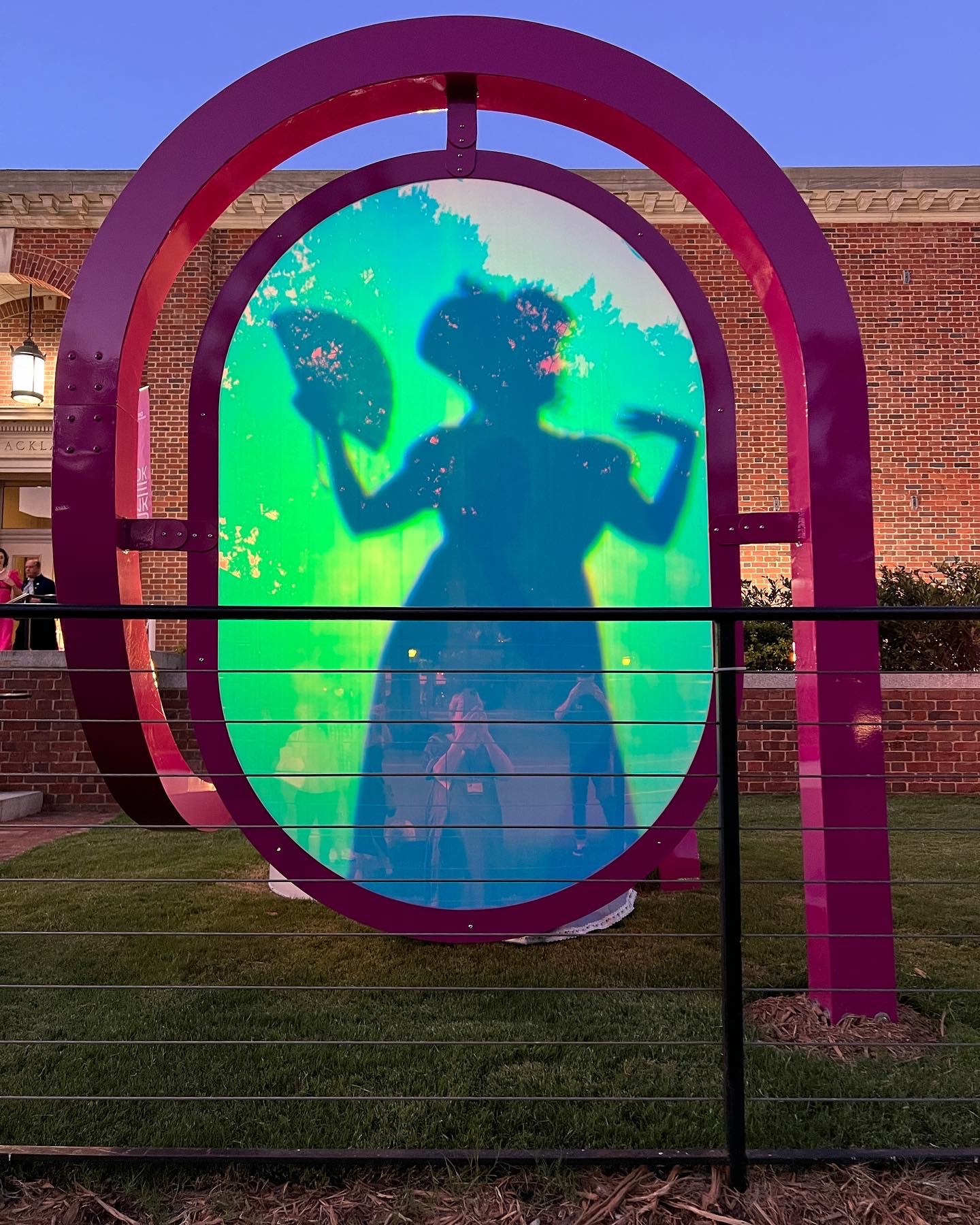
A participant poses behind an art installation outside the Ackland Art Museum during the mystery event. (Photo by Christine Watkins)
People came from far and wide to experience Jane Austen’s world and to connect with fellow Austen-lovers. One teacher and her daughter traveled from Buffalo, New York, to be part of the program. Participants typically come from all backgrounds and occupations. In 2019, they ranged in age from 11 to 81.
“One of the main values is the community that’s formed out of it and through literature,” Brodey said. “We have well-known academics that come from other regions and others who are also local. We have grad students who do the theatricals, give some of the talks and help lead some of the small-group discussions. We have undergrads who help as interns. And there’s also a Carolina undergraduate class associated with it that does poster displays.”
At the conclusion of the night, guests who had collected all three pieces of a sheet of music — by solving puzzles and accusing the right suspect — took them to “Mr. Knightley” (played by Stephen Alltop, a professor of keyboarding and conducting at Northwestern University’s Bienen School of Music) at the piano. He proceeded to play a piece of music for them that was familiar to all but hard to place for many — the William Tell Overture. “Julia Bertram” (Brodey’s daughter, Clara) encouraged guests to think of another William with whom they might be familiar … William Shakespeare, of course.
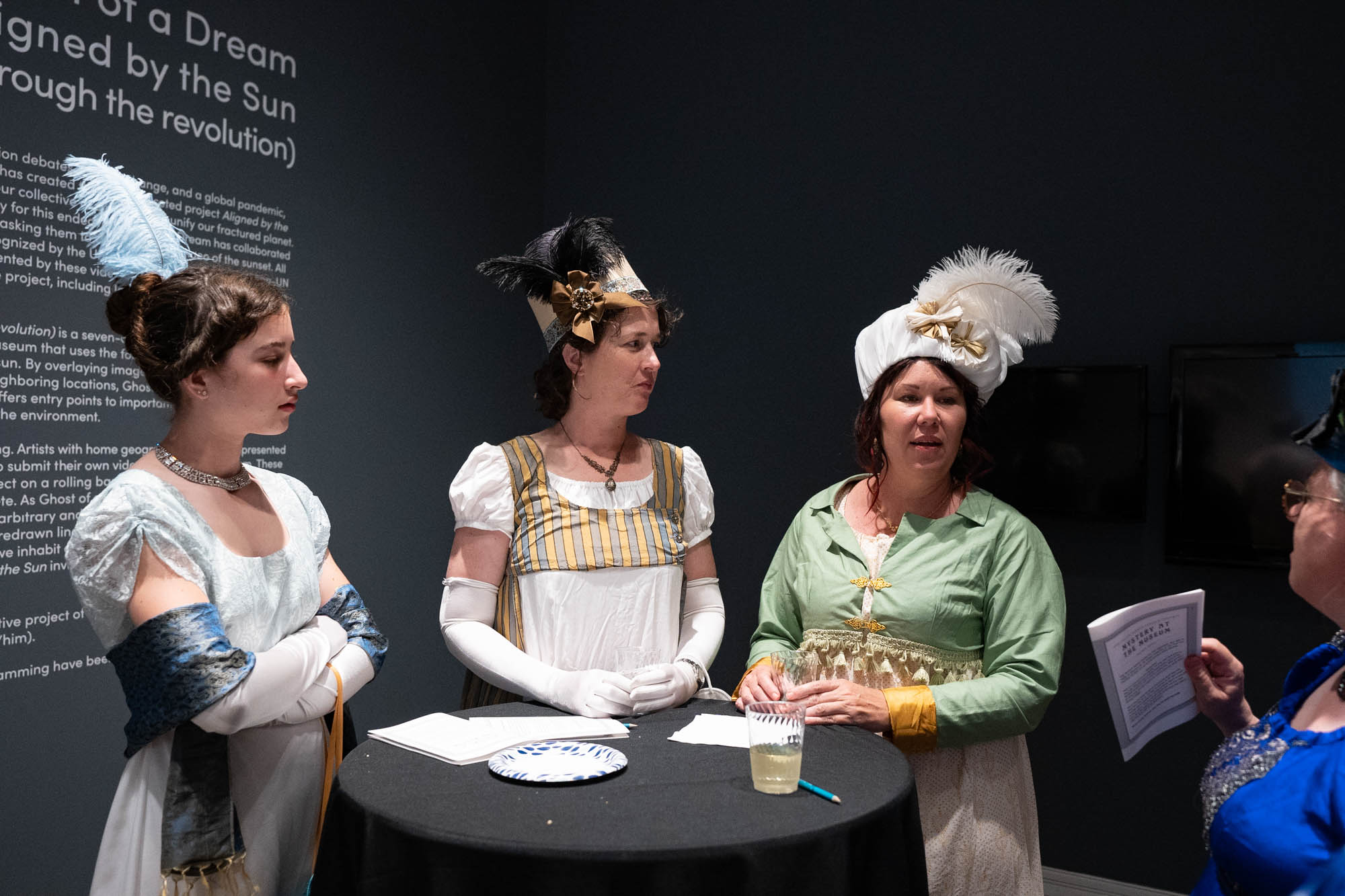
Attendees take a break during the mystery event. (Photo by Lucas Pruitt)
Once they knew the who (Tom Bertram, played by Erica Sabelawski), the where (the storehouse sculpture) and the why (ransom to pay off a gambling debt), all that was left was to find poor Pugsley. When guests ventured upstairs, they found a cardboard cutout of William Shakespeare and, behind it, a box containing the elusive stuffed pug. By this point, many guests had formed small groups, meeting people they had not arrived with throughout the night and teaming up to solve the mystery.
It is this community bonding over literature, Brodey said, that makes the Jane Austen Summer Program so special.




